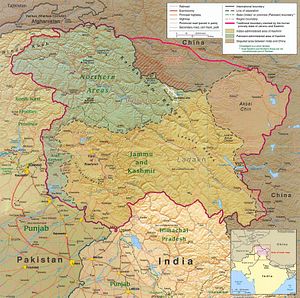In recent days, India has faced off with both Pakistan and China on its disputed Kashmir borders. Pakistani rangers opened fire on Indian border outposts along the Line of Control (LoC, the military border demarcating India-administered Kashmir from Pakistan-administered Kashmir) in what constituted a major ceasefire violation. Casualties included one Border Security Force (BSF) soldier and three more injured. Meanwhile, Chinese People’s Liberation Army troops crossed the Line of Actual Control (LoAC, the boundary demarcating the India-administered part of Kashmir from the Chinese-administered Aksai Chin region) and were stopped by the Indian army, assisted by the Indo-Tibetan Border Police (IBTP). The stand-off lasted no longer than 30 minutes and was resolved peacefully with the PLA soldiers eventually returning to the Chinese side of the LoAC.
Both incidents demonstrate that despite positive diplomatic rhetoric from all three governments, the border situation in Kashmir remains tense. Ceasefire violations by Pakistan, in particular, proved highly destabilizing to bilateral relations between India and Pakistan in 2013. Meanwhile, the India-China Border Defense Cooperation Agreement (BDCA), signed in October 2013 between India and China in Beijing, was meant to prevent a recurrence of these sorts of incidents. According to the Times of India, the 30 minute stand-off involved Indian troops warning the Chinese troops to refrain from advancing furthers. The report further notes that the Chinese troops were on horseback. The incursion took place near Chumar.
By some measure, the BDCA may have proved successful in this instance as it prevented a prolonged episode like the April 2013 Daulat Beg Oldi incident when Chinese PLA troops spent over three weeks in India-administered Kashmir before retreating. That Indian and Chinese forces were able to resolve this latest stand-off without any perceivable central government interference from either side establishes that the BDCA’s military-to-military mechanisms are working as envisaged.
The timing of the Chinese incursion is unfortunate as Indian Prime Minister Narendra Modi and Chinese President Xi Jinping declared their intention to negotiate a solution to their border disputes when they met in Fortaleza, Brazil earlier this week, ahead of the BRICS summit. Commenting on the border incident with China, Indian Home Minister Rajnath Singh commented that “Incursions along the border take place due to the difference of perception about boundary.” Negotiations between the two sides will focus on ending ambiguities about what is perceived to be Indian territory and what is perceived to be Chinese territory in Kashmir.

































